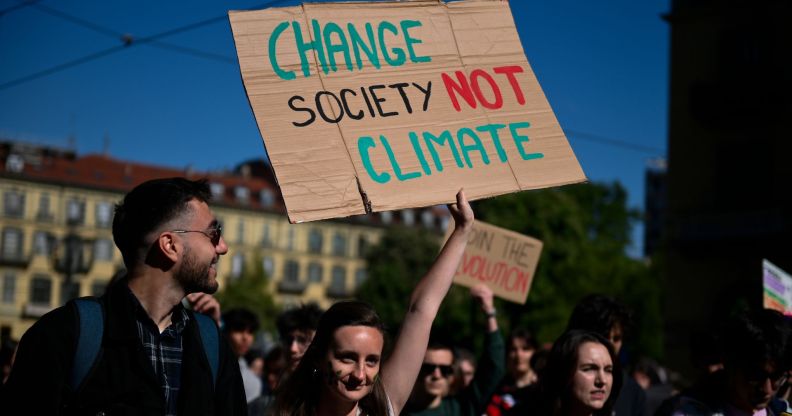LGBTQ+ couples at greater risk from climate change impact, study finds

LGBTQ+ couples at greater risk from climate change impact, study claims (Stefano Guidi/Getty Images)
A new study has found that LGBTQ+ couples are disproportionately at risk from the impacts of climate change compared to heterosexual couples.
The study, released by the Williams Institute at UCLA School of Law in April, found that same-sex couples are at greater risk of experiencing the impacts of climate change, in part because queer people are more likely to live in cities, coastal areas, and areas with poorer infrastructure.
The study used US census data, climate risk assessment data from NASA, and the Federal Emergency Management Agency (FEMA) to look into the climate risk facing LGBTQ+ couples based on their geography.
The study’s results found that counties in the US with a higher proportion of same-sex couples – for example in large cities and coastal areas – are at increased risk from the effects of climate change like flooding and air pollution.
“Climate change represents a global challenge, but it also exacerbates existing disparities among individuals and communities,” the study explains, adding that LGBTQ+ people can experience discrimination relating to housing, employment, education, and accessing services, which may create further challenges when it comes to experiencing the effects of climate change.
The study added that LGBTQ+ people of colour are “three times more likely than white straight cisgender people to live below the federal poverty line”, while transgender immigrants are “more likely than non-LGBTQ+ people to report negative health outcomes and experience barriers to accessing healthcare”, meaning that they have less available resources to adapt to natural disasters.
“These differences have a meaningful impact on both how LGBTQ+ communities experience climate change and their ability to respond to it,” the study read. “Notably, poor infrastructure and a lack of necessary resources can leave certain areas more vulnerable to climate hazards.”
The study’s authors noted that LGBTQ+ people should be factored in to climate policies, and that more should be done to protect the “vulnerable” community.
“Given the disparate impact of climate change on LGBTQ+ populations, climate change policies, including disaster preparedness, response, and recovery plans, must address the specific needs and vulnerabilities facing LGBTQ people,” the study’s co-author Ari Shaw, senior fellow and director of international programs at the Williams Institute, said.
“Policies should focus on mitigating discriminatory housing and urban development practices, making shelters safe spaces for LGBTQ+ people, and ensuring that relief aid reaches displaced LGBTQ+ individuals and families.”

